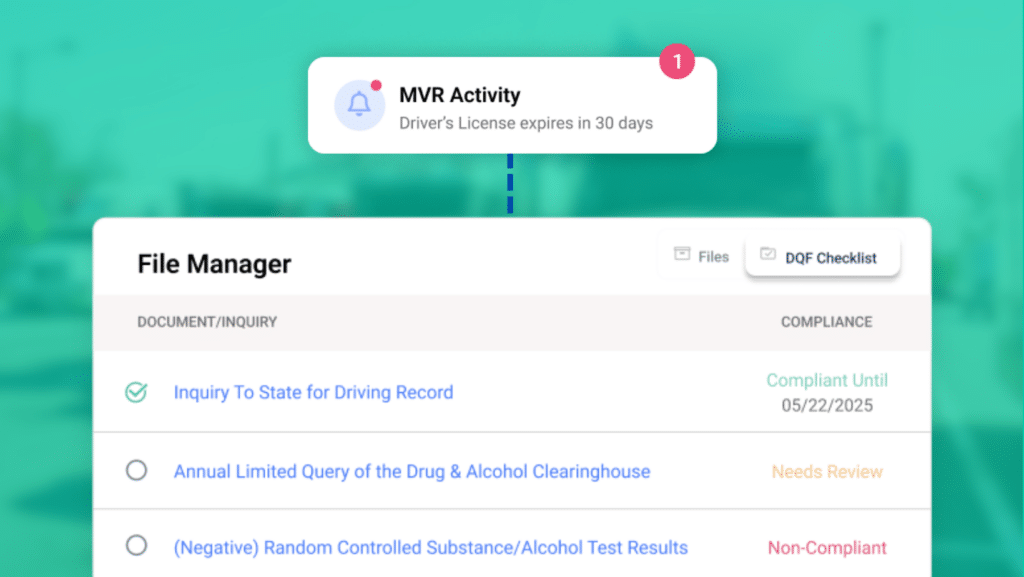6 DQF Management Errors Leading To Violations

Imagine your company facing costly fines or even a shutdown because of simple mistakes in your Driver Qualification Files (DQFs). These ‘small errors’—like missing or outdated documents—can lead to major compliance issues for your business.
As audits become more frequent and increasingly digital, staying on top of your driver files is essential. Let’s look at six critical DQF management mistakes that could put your fleet at risk—and how to prevent them.
Why DQF Violations Are So Common?
Driver Qualification Files are records that employers must maintain to prove that their drivers meet the Federal Motor Carrier Safety Administration (FMCSA) requirements for operating commercial motor vehicles (CMVs). These files help ensure that all drivers are properly vetted and qualified to perform driving duties safely. Read more: Driver Qualification Files: What to Include & How To Maintain Them?
Although DQF management might be a straightforward process for some, many companies struggle with driver file challenges. Every year, at least 20% of all acute and critical violations are related to driver files. FMCSA rules require fleet managers to maintain detailed records, such as medical certificates, employment history, drug and alcohol tests, MVRs, and other records. These records can be difficult to track, especially for companies still using manual processes. High driver turnover further complicates the process, with missing or incomplete documentation leading to non-compliance.
The shift to DOT remote audits has increased the need for well-organized digital records. Many companies are still adjusting, resulting in violations due to missing or outdated documents. Additionally, large fleets with multiple drivers across different locations face even greater challenges in maintaining compliance, particularly without a centralized system to track records.
2024 Closed Enforcement DQF Violation Cases
Recordkeeping violations increased this year from $1,496 to a maximum daily penalty of $1,544, and a maximum total penalty of $15,445, up from $14,960.
In 2024 alone, fines for closed cases related to DQF violations and other infractions have totaled $41,164,404. See below some recent cases:
| Violations | 2024 Cases & Penalties |
| General qualifications of drivers. (b)(5) Has a currently valid commercial motor vehicle operator’s license issued only by one State or jurisdiction; | A motor carrier in Bradenton, FL, was fined $1,170 in 2024 for violating code 391.51(b)(5). |
| General qualifications of drivers. (b)(5) Has a currently valid commercial motor vehicle operator’s license issued only by one State or jurisdiction; | A motor carrier in West New York, NJ, was fined $800 in 2024 for violating code 391.51(a). |
| Failing to maintain a driver qualification file for each driver | A motor carrier in Tracy, CA, was fined $2,400 in 2024 for violating code 391.23(a) |
| Failing to perform a Safety Performance History on one or more drivers | A motor carrier in Whitehall, NJ, was fined $5,610 in 2024 for violating code 391.41(a) |
| General requirements for driver qualification files. (b)(2) A copy of the motor vehicle record received from each driver’s licensing authority pursuant to § 391.23(a)(1); | A motor carrier in Oconomowoc, WI, was fined $9,480 in 2024 for violating code 391.45(a) |
| Any person who has not been medically examined and certified as physically qualified to operate a commercial motor vehicle; | A motor carrier in Austell, GA, was fined $6,030 in 2024 for violating code 391.45(b). |
| No medical certificate in the driver’s possession | A motor carrier in Austell, GA was fined $6,030 in 2024 for violating code 391.45(b). |
6 Critical DQF Management Errors Leading To Violations
By understanding common errors in DQF management, fleet managers can proactively address gaps and protect their drivers and business.
Here are six critical DQF management errors that frequently lead to violations and how to avoid them.
1. Missing Key Documents
One of the most common DQF management mistakes is incomplete files. Every driver qualification file must include critical documents such as the driver’s employment application, background checks, Motor Vehicle Records (MVRs), road test certificates, and medical examiner’s certificates. Missing just one document can put your company at risk of FMCSA violations.
2. Improper Storage of DQFs
DQFs must be easily accessible, organized, and stored securely. Many fleets fail compliance simply because they misplace files or fail to have them available for audits. Paper-based filing systems are particularly vulnerable to human error, lost documents, or disorganized storage. With FMCSA audits done remotely, keeping these records easily available in a digital format is even more important.
3. Failing to Update Records Regularly
Driver qualifications aren’t static. Documents like MVRs, medical certificates, and endorsements need regular updates to ensure your drivers remain qualified to operate vehicles. Additionally, as records change, make sure to address inconsistencies between the driver’s MVR and DQF, such as changes in license or medical certificate status, CDL endorsements, or violations.
4. Not Performing Self-Audits
Failing to conduct regular self-audits of your DQFs is a critical mistake that leaves your fleet vulnerable to violations during an official FMCSA audit. Many fleets wait until they are audited to review their DQFs, but by then, it’s often too late to correct any deficiencies. Schedule periodic internal audits, at least quarterly, to ensure that documents are current, errors are corrected, and your fleet is always prepared for an official inspection.
5. Improper Record Retention
FMCSA regulations require that specific documents in a DQF be kept for certain periods. For example, most driver qualification files should be retained for three years after a driver leaves the company. Discarding files prematurely or failing to archive them properly can lead to compliance failures in case of a future audit or investigation.
6. Overlooking Training and Certification Requirements
Drivers need ongoing training and certifications to maintain their qualifications. Whether for handling hazardous materials, staying compliant with DOT drug and alcohol policies, or addressing corrective actions from MVR violations, failing to ensure your drivers meet these requirements is a costly mistake.
Addressing Driver File Issues With a DQF Management Tool
Incorporating DQF management software will ease most of your DQF management challenges. First, with this tool, your driver files are digitally available and centralized in a single platform. This means you no longer have to sift through endless paperwork or navigate multiple systems to access critical information. Instead, you have a user-friendly dashboard that provides a comprehensive overview of your fleet’s compliance status.

Whether a document is missing or nearing expiration, everything you need is conveniently displayed as a checklist of required documents and retention dates for each driver. Moreover, you can easily monitor the status of these documents in real-time. The platform allows you to set up proactive alerts to notify you when files are incomplete or near expiration.
Embark Safety’s DQF Manager seamlessly integrates with other driver management solutions, including MVR Monitoring, to create a comprehensive approach to fleet safety and compliance. This powerful integration allows for near real-time monitoring of critical driver information, such as changes in driving records, license status, and medical certificates.
Protect your fleet and operations
Maintaining compliance with DQF regulations isn’t just about avoiding fines—it’s about ensuring the safety of your drivers and everyone on the road. By staying vigilant, conducting regular self-audits, and leveraging a digital DQF management tool, you can prevent costly errors and remain prepared for FMCSA audits. Don’t let avoidable mistakes jeopardize your operations. Take action now to ensure your DQFs are complete, current, and compliant.
Explore MVR Monitoring + DQF Manager
*We are not lawyers. Consult with your legal counsel to ensure your processes and procedures meet/ or exceed safety standards and compliance regulations. Please read our legal disclaimer.






